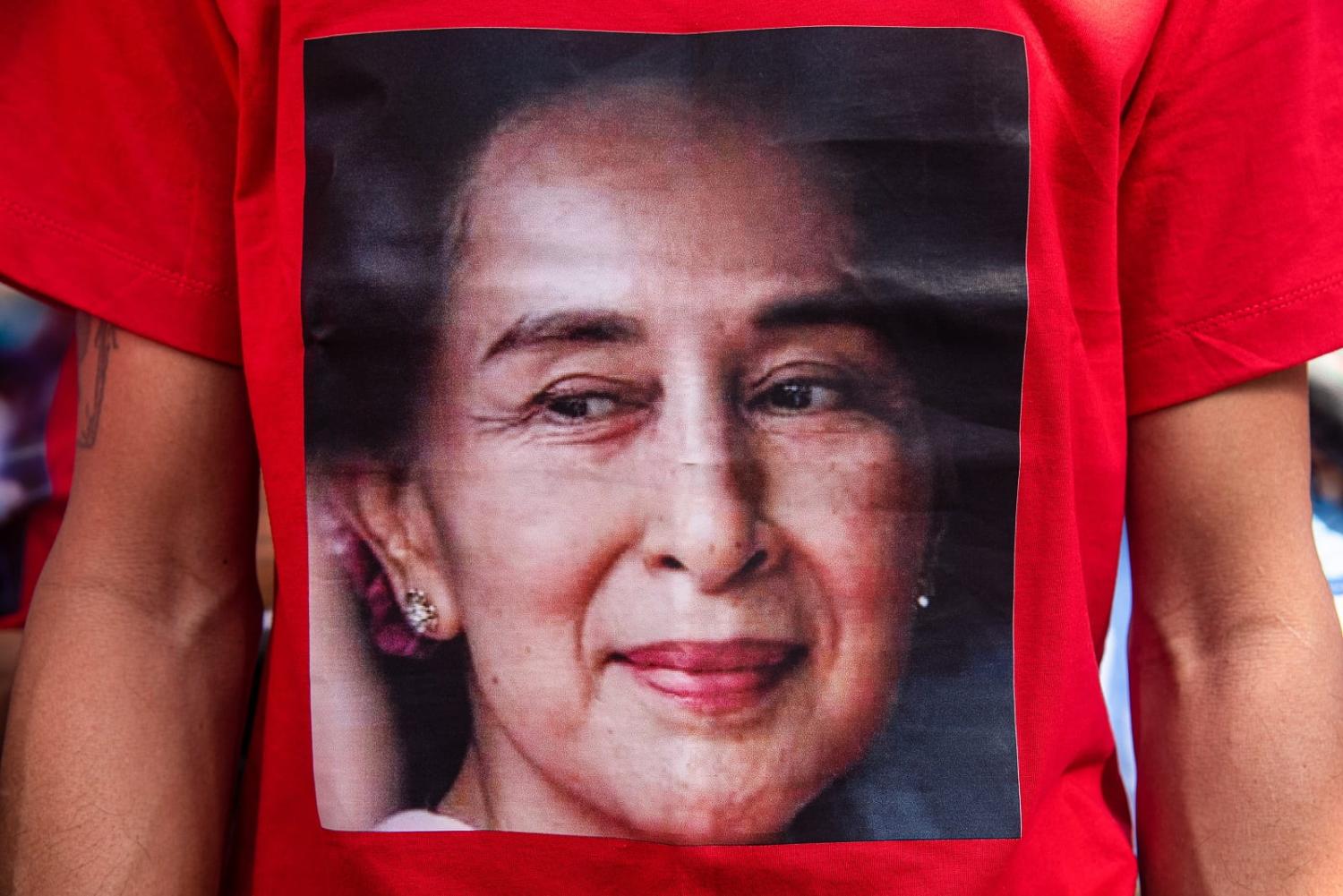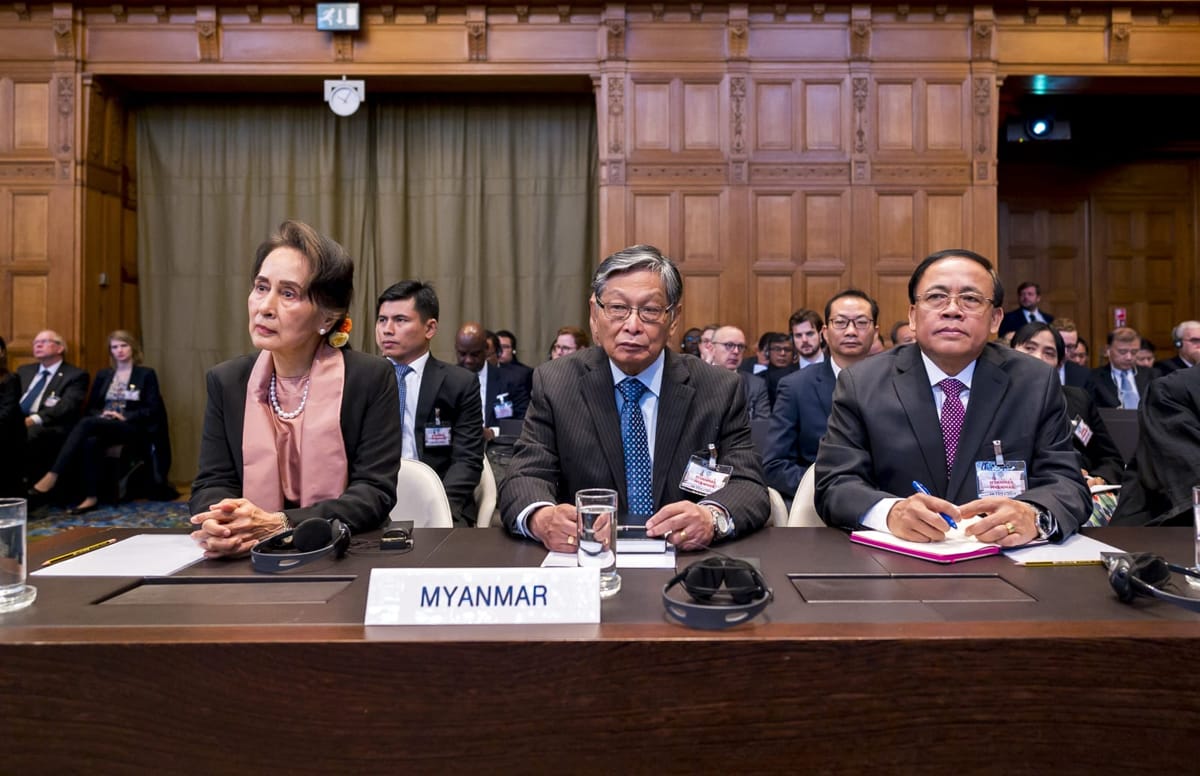Many in Myanmar have condemned what they perceive as
seriously flawed Western criticism of the Burmese ex-leader.

Many of Aung San Suu Kyi’s closest collaborators have condemned what they see as seriously flawed Western criticism of her policies
seriously flawed Western criticism of the Burmese ex-leader.

Many of Aung San Suu Kyi’s closest collaborators have condemned what they see as seriously flawed Western criticism of her policies
(Peerapon Boonyakiat/SOPA Images/LightRocket via Getty Images)
Published 22 Feb 2024
LOWY INSTITUTE
AUSTRALIA
On 18 October 2023, the Brighton and Hove City Council in the United Kingdom revoked the Freedom of the City awarded to Burmese politician Aung San Suu Kyi in 2011. Their special meeting lasted only 18 minutes, with Councillor Bella Sankey, the Labour leader of the Council, stating that it was not right to honour a person who “presided over the ethnic cleansing and genocide of the Muslim Rohingya community” and was “an enabler to racial and religious discrimination and ethnic cleansing”. Sankey was supported by all 50 or so of the Council members present.
This revocation was the latest act by Western institutions and human rights groups, at times inclined to zealotry and intolerance, to humiliate and punish Suu Kyi for her perceived failure to “speak out” against the persecution of the Rohingya Muslim ethnic minority in Myanmar. Yet not one of her critics has ever attempted to say why she supposedly did not speak out, nor offered any word of explanation other than, like Bob Geldof, to denigrate her as a “handmaiden to genocide”.
Their main concern has been to topple her from the pedestal on which they put her, and not to seek to understand her fraught and fragile relationship with the military, which has led to her detention and imprisonment for more than three years.
This year, an invaluable compendium of documents was published by the American Buddhist scholar Alan Clements and his British colleague Fergus Harlow entitled “Burma’s Voices of Freedom”, which includes interviews, articles and speeches by Suu Kyi and several of her Burmese associates. The four-volume set offers a clear and persuasive narrative of her policies from a Burmese perspective, which would come as a complete surprise to many of her Western critics.
Suu Kyi indeed acknowledged that she had not “spoken out” on the Rohingya crisis because to do so would only make matters worse.
Suu Kyi’s consistent approach over the years to the Rohingya – as on all issues – is inspired by the Buddhist virtues of loving kindness (mettā), compassion (karunā), empathetic joy (muditā) and equanimity (upekkhā). In practical terms it is based on:Reconciliation, not condemnation. A refusal to take sides in the communal disturbances between Muslims and Buddhists in Rakhine State.
Cooperation with the military at all costs. A refusal to condemn publicly, but to search for a modus vivendi with the aim of securing their understanding and support for the country’s political transition.
Determination not to endanger the prospects for democratic change after so many years of military rule, even at the risk of being seriously misunderstood in the West.
Suu Kyi had discussions with a considerable number of Western politicians and personalities once she began to travel overseas in 2012. To some, she would undoubtedly have explained in confidence how fragile was her position, but publicly she did not dare make reference to this. Her spokesman, U Win Htein, confided to Clements on 10 April 2015 that Suu Kyi “did clearly express her position about the Rohingya, but what she expressed was that, if she spoke up for the Rohingya or advocated too heavily on their behalf, it would have unfavourable repercussions among the Burmese … It might help the international community understand the situation, but it won’t help Burma.”
Suu Kyi indeed acknowledged that she had not “spoken out” on the Rohingya crisis because to do so would only make matters worse, sully her relations with the military, and endanger her very political existence. Yet this is what human rights organisations pressed her to do. Instead, Suu Kyi put the interests of her country before her personal reputation. In an interview with NHK World (Japan) on 6 October 2018, she stated, “I don’t care about prizes and honours as such. I am sorry that friends are not as steadfast as they might be. Because I think friendship means understanding, basically, trying to understand rather than to just make your own judgement. But prizes come and prizes go.”

Aung San Suu Kyi (L), representing Myanmar, during 2019 proceedings at the International Court of Justice (ICJ)
On her decision to represent Myanmar at the International Court of Justice on 11 December 2019, Suu Kyi’s Burmese associates are unanimous that she did not go to The Hague to defend the military, but to appear as a representative of her country in their dispute with The Gambia, and to defend Myanmar’s honour and dignity. The human rights activist and Harvard graduate Ma Thida Sanchuang said in January 2020: “But for the eyes of the general public, Aung San Suu Kyi took the lead to defend our country’s image … The general public’s stand with her on the ICJ case was the signal … to show how much they are still against the military and its party.”
This is entirely opposite to most Western interpretations. Not surprisingly, many of Suu Kyi’s closest collaborators have condemned what they see as seriously flawed Western criticism of her policies, especially on the Rohingya. U Win Htein commented: “They are false judgements. They are misperceptions. They are from the uninformed and misguided … Daw Aung San Suu Kyi is one of the most compassionate people I have ever met.” A senior Buddhist monk, the late Myawaddy Sayadaw Abbot of Mingyi Monastery, was even blunter in December 2017: “Wait and see. Only those who revoked the awards will lose their dignity in the end.” And as Myanmar’s version of Lady Gaga, Phyu Phyu Kyaw Thein, a Christian, noted in January 2020: “But one thing for sure is Daw Suu, as a devout Buddhist, forgives them for she knows that ‘they know not what they say’.”
One day soon, Suu Kyi may be free to put the record straight. Her detractors can then eat humble pie, if they have the moral courage.
On her decision to represent Myanmar at the International Court of Justice on 11 December 2019, Suu Kyi’s Burmese associates are unanimous that she did not go to The Hague to defend the military, but to appear as a representative of her country in their dispute with The Gambia, and to defend Myanmar’s honour and dignity. The human rights activist and Harvard graduate Ma Thida Sanchuang said in January 2020: “But for the eyes of the general public, Aung San Suu Kyi took the lead to defend our country’s image … The general public’s stand with her on the ICJ case was the signal … to show how much they are still against the military and its party.”
This is entirely opposite to most Western interpretations. Not surprisingly, many of Suu Kyi’s closest collaborators have condemned what they see as seriously flawed Western criticism of her policies, especially on the Rohingya. U Win Htein commented: “They are false judgements. They are misperceptions. They are from the uninformed and misguided … Daw Aung San Suu Kyi is one of the most compassionate people I have ever met.” A senior Buddhist monk, the late Myawaddy Sayadaw Abbot of Mingyi Monastery, was even blunter in December 2017: “Wait and see. Only those who revoked the awards will lose their dignity in the end.” And as Myanmar’s version of Lady Gaga, Phyu Phyu Kyaw Thein, a Christian, noted in January 2020: “But one thing for sure is Daw Suu, as a devout Buddhist, forgives them for she knows that ‘they know not what they say’.”
One day soon, Suu Kyi may be free to put the record straight. Her detractors can then eat humble pie, if they have the moral courage.
No comments:
Post a Comment